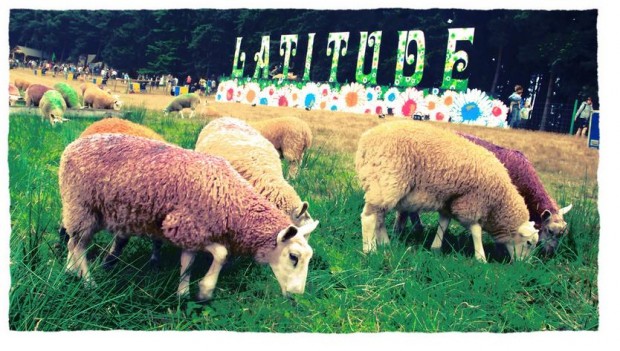You have no items in your cart. Want to get some nice things?
Go shopping
Latitude is a strange place. It’s a place where anti-establishment hippies go to live out their wild fantasies even as they munch on an overpriced falafel wrap, where Guardian readers believe they’re doing Good Liberal Parenting whilst their five year-old son listens to a sweary alternative rock act and where teenage boys sit at the front of a comedy tent for eight hours unengaged just to watch to Kevin Bloody Bridges. Beside all its contradictions, however, it’s remains a rather special festival, and for a weekend in July Suffolk becomes a place you can lose yourself and engage more thoroughly at the same time.
Though it’s impossible for any festival as big and as broad as this to have any genuine through-line, the shows and acts you see over the course of the weekend inevitably end up talking to one another in some way. At this year’s Latitude, my entirely subjective experience threw up two major themes which seemed to span the festival at large; feminism and resistance.
The first narrative kicked off during a discussion on Friday between Laurie Penny, Laura Bates and Zoe Pilger about “The F Word”. For an hour, the three panellists discussed modern feminism and its growing popularity, which ended with a beautiful moment as Penny became overwhelmed with emotion at the number of people in the tent who self-described as “feminists” (with a not-insignificant number of those hands belonging to men).
After this discussion, the theatre tent seemed to teem with feminist narratives, with the theatre tent holding host to Debrah Ehrhardt’s escape-story Jamaica Farwell and Phoebe Waller-Bridge’s filthy Fleabag at the same time as Litro Live told stories in the Shed next door. The culmination of these angry, empowered monologues was found in the provocative anti-male thrust of Alice Birch’s sublime Revolt. She Said. Revolt Again, which asked us to consider different ways of revolutionising gender relations . Elsewhere, feminist critiques took centre stage as Frisky & Mannish considered what a modern popular feminist anthem might sound like and Josie Long told stories of her attitudes to love and relationships.
Once your head gets full of these ideas, it’s almost impossible to not see them, and herein lies the true point of feminism; it allows you to view and critique cultural artefacts in an entirely new way. To this end, the sets of Lily Allen, Haim, Lykke Li, Clean Bandit and Goat all take on a new clarity as they assert themselves in a patriarchal society and create their own narratives.
Elsewhere, artists are getting angry at the state of the world around them, urging us to grab our metaphorical pitchforks and hold those in power to account. In the theatre tent, Mark Thomas discussed the way he and his fellow activists were betrayed by a member of their group who was spying on them a decade ago, and though he tells the tale with compassion it’s also filled with anger and becomes a kind of call-to-arms in its quieter moments. Even Forced Entertainment’s Void Story considers how a city copes when it has basically eaten itself, with a stripped back aesthetic drawing attention to the images on screen which have become little more than complex line drawings after some kind of apocalypse. Implicit in both these pieces is the argument that we cannot continue the way things are.
On the music stages, Billy Bragg, flies a particularly political flag, with songs like “I’m Not Your Handyman” and “New England” allowing an audience to chant along to anti-establishment rhetoric, whilst Grace Petrie’s multiple sets in smaller tents with protest songs including “Farewell to Welfare” and “They Shall Not Pass”, which it’s nigh-on impossible not to be buoyed and energised by.
Arguably the most angry and incisive work of the weekend, however, comes from the comedy tent. Alongside Josie Long’s strident and infectious political rants sits a Sunday morning newspaper session with Marcus Brigstocke, Mark Steel and Andrew Maxwell. Though the trio are sometimes over-sarcastic and Brigstocke in particular often demonstrates his public school bias, it’s an enlivening discussion which offers up the deliciously radical idea of popping the Queen’s head on a stick.
The most eloquent and enjoyable discussion of protest comes from Jeremy Hardy towards the end of the festival. Throughout his joyously cynical harumphing, he offers a hilarious criticism of modern-day neoliberalism, including a sideways look at the rise of UKIP and an invective about Michael Gove. At the end of his set, Hardy moves away from the easy targets to a slightly more controversial subject, as he argues in favour of anarchy with the suggestion that the anti-war protests of 2003 would have achieved something if things had kicked off in central London: “Where’s good old-fashioned police brutality when you need it?” It’s a brilliant routine which sums up the mood of the whole weekend; wistful but progressive, optimistic but cynical, knackering but ecstatic.

About Dan Hutton
Dan is a freelance critic and theatre-maker. He won the Howard Hobson Award for Theatre Criticism at NSDF in 2010, 2011 and 2013, and in 2013 was the runner-up for the Edinburgh Fringe Allen Wright Award for Arts Journalism. Dan is also a director and co-runs Barrel Organ Theatre.




